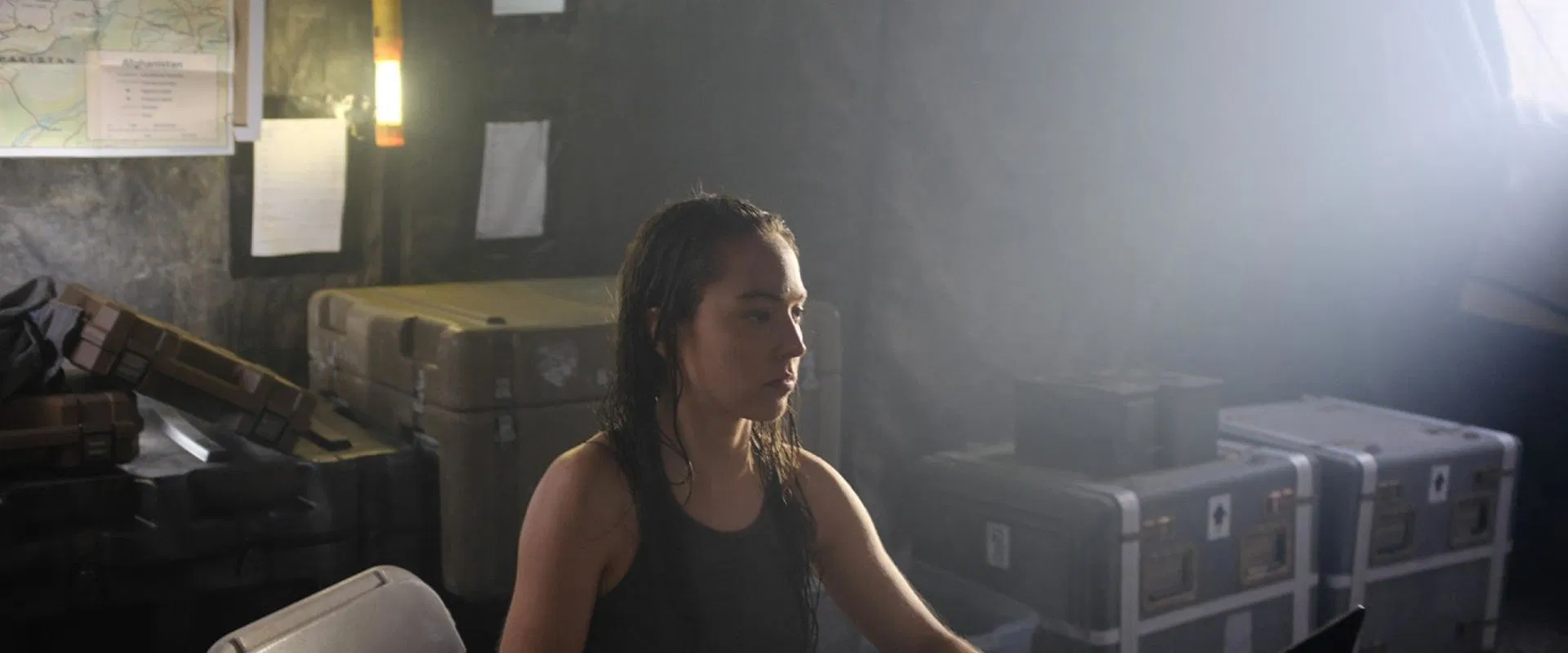Some films fail, but do so innocuously. Others fail with more urgency—they mishandle material so important, so inflammable, that their mediocrity becomes a kind of insult. The Vigilante is that sort of film: a chintzy, slapdash action-thriller whose wobbly attempts at blockbuster ferocity trivialize the monstrous reality of child trafficking. There’s no deeper disappointment at the movies than when righteous indignation is reduced to bad lighting, tepid performances, and the hollow rattle of fake gunfire.
Tubi bills this as an “original” about the unthinkable—a Marine (Jet Jandreau’s Jessica), returning home to find her sister trafficked by a local syndicate. We’ve seen the premise before, but here it’s loaded with the urgency of stolen children and broken futures. This should be cinema as alarm bell. Instead, it’s a tin whistle.
Jandreau, capable enough with her fists, is asked to shoulder an emotional burden far beyond what the script allows. Her Jessica is a cipher—she wears her suffering like a prop, never allowed to mourn or rage beyond the contours of formula. The few supporting actors seem neither appalled nor terrified by the hell around them. There is not a single convincing moment of grief, panic, or even indignation. The characters drift through the plot as passively as background extras, unable or unwilling to make you feel the stakes.
The story peddles urgency—every shot is a signpost, every action sequence a halfhearted attempt to conjure tension. Yet the movie is never interested in the dimensions of its subject. It is content to reduce child trafficking to “villains’ lair” set pieces and flat, unconvincing showdowns. The Vigilante ransacks the news for gravitas it cannot muster on its own. The result is not enlightenment or outrage, but a numbing sense of exploitation—a movie that steals the pain of real children and sells it for cheap catharsis.
Think about what this movie could have been. There are films—Trade, Eden, even the leaner stretches of Taken—that at least attempt to bear witness. The Vigilante uses the trappings of activism like set decoration, while returning, stubbornly, to generic personal revenge. Director Lee Whittaker seems most at home choreographing brawls and car chases, which are as overcut and murky as any you’d find in late-night cable fodder. Meanwhile, every flicker of real horror is pushed aside by the need to keep Jessica’s Marine ethos intact—courage as a cudgel, not a form of empathy.
The technicals are no better. Blurry, frantic editing and a funereal, flavorless score sap the fight scenes of whatever energy the script lacks. The camera rarely stays still; it’s as if it’s embarrassed to linger on the consequences of the violence or the faces of the victims. It is an atonal, anxious mess.
Most unforgivably, the film offers nothing in the way of insight or education about trafficking. We are shown neither the mechanisms of this real-world terror nor the emotional devastation wrought upon actual families. There is no community, no aftermath, no call to action. If this movie amplifies anything, it’s the danger of reducing the unthinkable to just another excuse for a shootout.
If you care about the epidemic of child trafficking, this film is not just an opportunity wasted—it’s a kind of cinematic malpractice. It asks the audience to gawk instead of grapple, to forget instead of remember. The Vigilante wears its “important message” like camouflage and, in the process, erases the very urgency it claims to honor. To witness suffering this grave rendered so shabbily is more than a letdown—it’s an abdication of responsibility.
Don’t mistake this film for activism, or even for serious entertainment. It’s perfunctory, opportunistic, and, despite its subject, essentially empty. The Vigilante should have been a rallying cry. Instead, it is background noise—a mediocre, even dangerous, failure.


